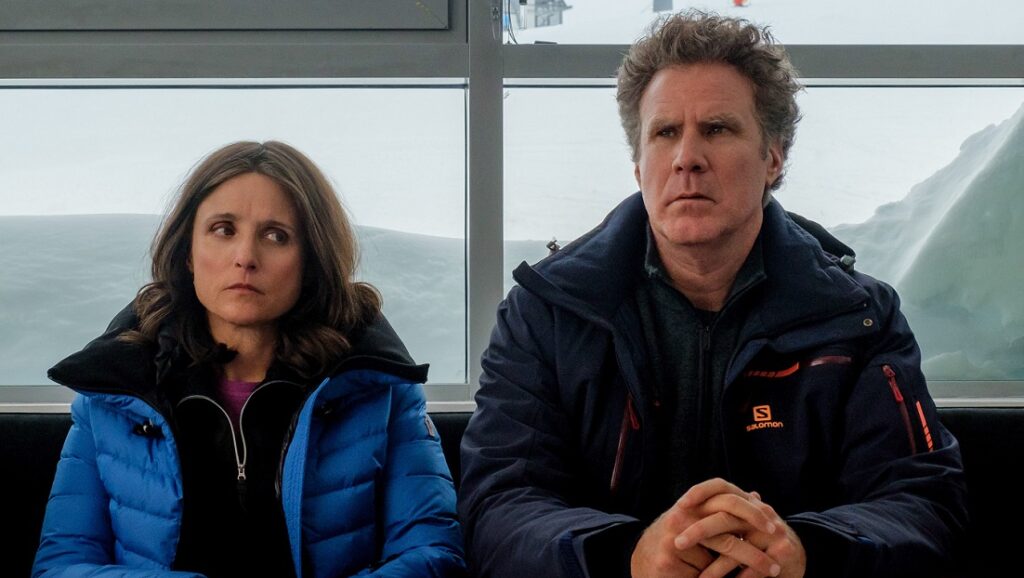The majority of American moviegoers probably have no idea that the new comedy Downhill is a remake of 2014’s French/Swedish co-production Force Majeure, directed by Ruben Ostlund. And so, in an bid at fairness and imagination, this review will attempt to abstain from comparison until the end, even as it goes against critical instinct. Will Ferrell and Julia Louis-Dreyfus star as a long-married couple on vacation with their two sons at a ski resort in the French Alps. They have accidentally booked a hotel that caters only to adults; nothing comes of this, save for an overly horned-up manager (Miranda Otto). He is pre-occupied with his phone; she is a control freak and wants him to be truly engaged with their family; everyone, regardless of age, skis like a bunch of Bodie Millers. When one of the village’s regularly-scheduled, controlled avalanches appears as though it is going to leave death in its wake, Mom holds tight to the kids, while Dad books it out of dodge, phone in hand. With everyone safe, one question remains: can this marriage survive Dad’s selfish act?
Nat Faxon and Jim Rash seem to have no interest in plumbing the emotional depths of this crumbling marriage.
Admittedly, the characterization is broad, but this is a great premise that could be used to address any number of fascinating topics, from gender normatives in modern-day relationships to the very concept of self-preservation in the 21st century. Plus, you’ve got Jesse Armstrong as a credited screenwriter, a man who knows a thing or two about thorny moral issues (Four Lions, In the Loop, HBO’s Succession). But co-screenwriters — and co-directors — Nat Faxon and Jim Rash seem to have no interest in plumbing the emotional depths of this crumbling marriage. Perhaps getting the two guys responsible for Alexander Payne’s most generic, mainstream film (The Descendants) — as well as helming 2013’s Little Miss Sunshine wannabe The Way, Way Back — wasn’t the wisest decision. I’m going to take a shot in the dark here and guess the majority of this script is courtesy of them, unless Armstrong would like to take credit for the scene where Louis-Dreyfus attempts to masturbate in a bathroom stall, leans against the door, and tumbles out like a modern-day Jack Tripper.
Which brings us to the other major problem with the film: it isn’t funny enough to be a comedy, but lacks any necessary depth to truly resonate with audiences or engender investment in the outcome. However, one scene cuts through the sitcom shenanigans with pin-point precision, that in which Louis-Dreyfus explains to two acquaintances the events of that fateful moment. As myriad emotions ping-pong across her face, you begin to truly understand why this woman feels as if the bottom has fallen out of her marriage, in turn leading her to question her life as a whole. She is sad, lost, angry, confused, hopeless, and the only thing her husband can do is question the accuracy of her recollection of the events; it is the lone moment in the film that feels genuine. Then she goes and makes out with a ski instructor, and I honestly have no idea what the hell is going on. Louis-Dreyfus deserves more big screen roles, and she deserves more than this. So while Force Majeure may not be perfect, it clears the admittedly low bar of being better than this by virtue of being and attempting something. Comparison complete.


Comments are closed.